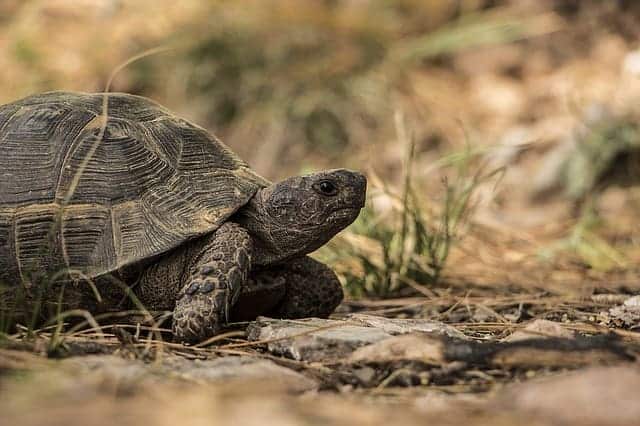Whilst UV light is necessary for captive tortoises, it’s also possible for them to get too much UV. In the wild, tortoises can retreat in shadowed areas and they also do not stay out in the sun all the time. Therefore, having a UV bulb on all the time in your enclosure may be too much for your tortoise.
If you’ve done your research, you probably know that tortoises need a UV bulb in their enclosure. They also need a basking spot where they can get both heat and UV light for healthy development and growth. Without these lighting features your tortoise may be living in sub-optimal conditions, especially if you always keep them indoors.
You can check out how to arrange the lighting in your tortoise enclosure here.
But is there such a thing as “getting too much UV light?” Do you have to keep the UV bulb on all the time for the tortoise to stay healthy? We will answer these questions in this article.
Do All Tortoises Need a Lot of UV Light?
A source of UV light is one of the things you need in your tortoise’s enclosure from the get-go. If you keep your tortoise indoors instead of outdoors, then you need to imitate the natural environment of the reptile as closely as you can. For this to be possible indoors, you need UV light. Can UV light be too much sometimes, though?
It all depends on the species. Tortoises of different species have differing requirements when it comes to the amount of UV light they need. For example, red-footed tortoises, who hail from the rain forests of South America, tend to spend much of their time under the canopy of trees, venturing out to bask in the open less frequently then other species. As a result, they are less dependant on a constant UV exposure.
Meanwhile, a sub-tropical or desert species such as a Sulcata tortoise is going to require more light. In the wild, they stay in the sun a lot, so when captive, they should have access to UV light for extended periods, ideally outdoors with the sun as the source.
Mediterranean tortoises also enjoy warmth and light, so they need plenty of UV light exposure in order to get their vitamin D3.
Having said all that, there is slightly more to it than this. You also have to consider the natural UV light levels the tortoise might get based on their proximity to the equator. For instance, species that are closer to the equator will automatically get more sunlight in comparison to those that are further away from it. That is why a species like red-footed tortoises can live with a shorter exposure time to UV, given that the exposure they get in the wild is stronger than species who live further north.
This should be taken into account when deciding how much UV exposure your tortoise should have.
What Type of UV Light Is the Best for Tortoises?
When you want to buy UV bulbs for your tortoises, you will notice that there are different types available that you can choose from. More specifically you will come across UVA and UVB bulbs.
While both UVA and UVB light is helpful for tortoises, each one of them has a different effect on the tortoise’s physiology that help maintain the well-being of the reptile in different ways
UVA light, for instance, can help regulate different behaviors in your tortoise. These include mating, feeding, diurnal movement, and many others.
UVB light on the other hand, is very important for the synthesis of vitamin D3, which is very important for the tortoise. As well as playing a role in immunity and a whole range of other biological processes, vitamin D3 helps absorb calcium properly, so it is a must for your tortoise. In fact, all reptiles should have UVB light provided.
Lastly, there is also UVC light, but this is not necessary for reptiles. In fact, exposing your tortoise to UVC light for too long can even be harmful. One of its benefits is that it kills bacteria, but as mentioned, this is not something that tortoise requires if they are healthy and kept in the right conditions. UVA and UVB lights are all that are required.
You’ll find there are combined UVA/UVB lights available which are a great option as they cover both requirements.
Can Something Bad Happen If the Tortoise Gets Too Much UV Exposure?
If you’ve just become a tortoise owner and you’re looking for UV bulbs to purchase, you might be wondering whether too much exposure could harm your tortoise.
Come to think of it, isn’t natural light also dangerous with too much exposure?
With natural light, there can be possible complications arising from too much exposure. For instance, a tortoise’s skin can be damaged, or it may even suffer with sunburn, although it must be said that the latter is very rare.
What about the light from a UV bulb? Well, it is unlikely for tortoises to experience any complications from correct UV bulb light exposure. At the same time, too much exposure to UV light can be a little harmful in some situations – so, you should not overdo it.
For instance, there is a risk of getting too much vitamin D3, as it can cause skin issues that resemble sunburn, as well as other medical problems. Moreover, UVB bulbs have a different light ratio compared to the sun, so that also comes into play, as duration of exposure to the sun can’t be compared to the same duration of exposure to a UV bulb. Some UVB bulbs are also better while others should be avoided.
The best thing you can do is to consider the natural habitat of your tortoise species. Does it naturally live closer to the equator? If it does, then it will need either longer, or a more intense UVB exposure. If the tortoise hails from further away from the equator, then it will need less UVB light.
Another consideration is that you must leave the lights on for an appropriate amount of time every day. No more than 8-12 hours (depending on the natrual geographical location of the tortoise as decribed above) should be spent with the lights on. If possible also try to imitate the natural environment of the tortoise, and the hours the sun comes up, and when it sets.
Also, if you tend to bring the pet outside for several hours every day, then the light of a bulb will not be as necessary.
The Bottom Line
Tortoises need UV light to stay healthy, but too much of it is not necessary either. Be sure to research your particular tortoise’s species and fulfill the light requirements accordingly. Every species is different and will need specific light levels depending on where they live when they are in the wild.


